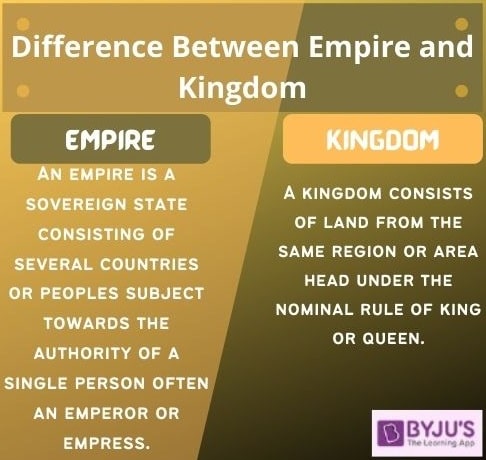The terms ‘empire’ and ‘kingdom’ are used interchangeably quite often. But they both have key differences between them.
For starters, an empire is a collection of different countries ruled by an emperor/empress while a kingdom may consist of a single domain or more which is ruled by a king or a queen.
This article will give further details about the differences between an empire and kingdom within the context of the IAS Exam
Empire vs Kingdom – Points of Difference
Given below is a tabulated difference between Empire and Kingdom. Candidates can refer to the same to know the key difference between the two.
Difference between Empire and Kingdom
| Empire |
Kingdom |
| An empire is a sovereign state consisting of several countries or peoples subject towards the authority of a single person often an emperor or empress. | A kingdom consists of land from the same region or area head under the nominal rule of king or queen. |
| An empire is always ruled by a singular authority, in this case, being the emperor/empress | A kingdom can have more than one ruler at a time. In the event it has two kings it is known as a diarchy and a kingdom ruled by many kings is known as an oligarchy |
| An empire grows larger by expanding and absorbing individual states and nations. For better administration, a representative of the emperor, who acts as the governor of the region will carry out day-to-day administrative functions. | A kingdom will transition into an empire when it absorbs other city-states through conquest until it grows more than its original size. |
| Usually, an emperor or empress is the absolute authority who makes critical decisions regarding the empire, but in certain setups, the voice of powerful aristocrats are also heeded. | A king or queen is the absolute authority, but in the case of a constitutional monarchy, its authority may be limited by a parliament or any other ruling body of ministers. |
| Example of empires: Roman Empire, Byzantine Empire, Ottoman Empire, Mongol Empire, Mauryan Empire. | Example of kingdoms: the Odrysian Kingdom, Etruscan kingdom, Travancore kingdom, Ahom Kingdom |
Apart from the difference between Kingdom and Empire, aspirants can get 100+ difference between articles at the linked article, and learn the points of similarities and dissimilarities for various terms from multiple fields.
For further readings candidates can refer to the following articles:
Difference between Empire and Kingdom – Download PDF Here
Frequently Asked Questions about Empire and Kingdom
How are empires different from kingdoms?
Who is an emperor?
Aspirants can find the complete UPSC Syllabus through the linked article. More exam-related preparation materials will be found through the links given below
Related Links

Comments